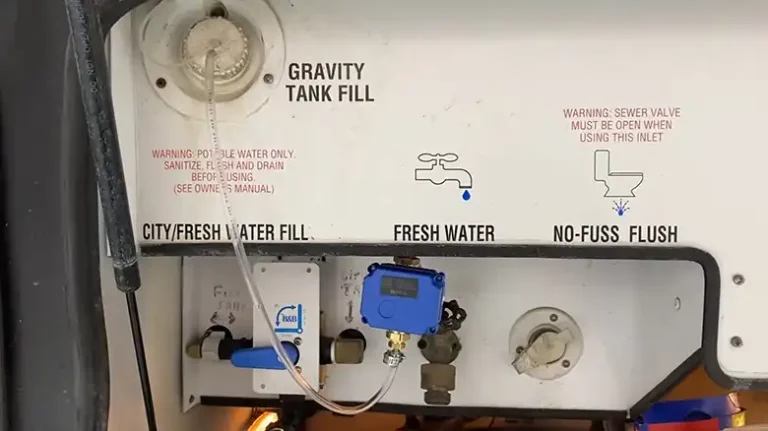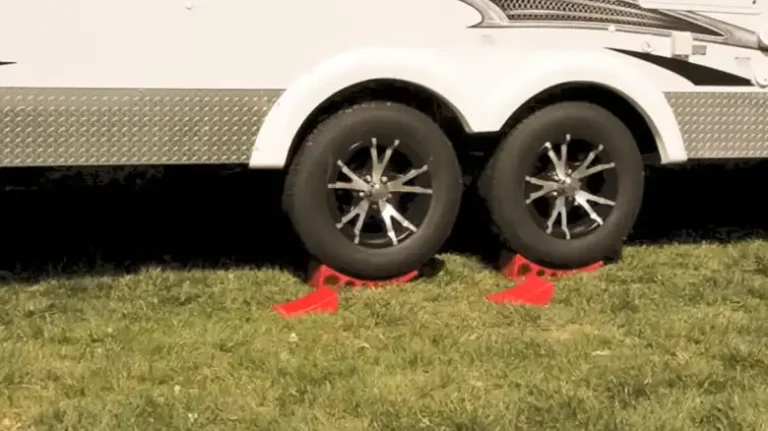How To Eliminate Truck Bounce When Towing? What did I follow?
Towing a trailer behind your truck can feel like a true test of your driving skills. You know what’s not fun? When that trailer starts to bounce around like an over-caffeinated kangaroo. Trucks can bounce for a number of reasons including improper weight distributions, damaged suspension parts, underinflated tires, etc. I know it’s pretty annoying, especially while you’re towing for a long distance. This is why I’m here to save you from this problem. I‘ve discussed the relevant solutions to fix it.
In this article, I’ve provided overall information about the reasons behind truck bounce, explored the potential dangers, and, most importantly, equip you with a toolbox of knowledge to ensure your future towing adventures are as smooth as a well-paved highway.
So, without taking any longer, let’s get started!

How Do I Eliminate Truck Bounce When Towing
Now that you’ve pinpointed the culprits behind truck bounce, it’s high time to go for the solutions. Here’s a comprehensive guide on how to ensure your towing experience is smoother than a freshly paved road –
1. Proper Weight Distribution
To maintain a smooth towing experience, ensure your cargo is evenly distributed across your trailer. Utilize load bars and weight distribution hitches to keep your load balanced. Ensure that the majority of the weight is placed in the center of the trailer, avoiding excessive weight on either end. A balanced load is essential for reducing bounce.
2. Suspension Check
Your vehicle’s suspension components play a pivotal role in absorbing shocks and maintaining a smooth ride. Regularly inspect and maintain your suspension system to ensure it’s in optimal condition. This includes checking for signs of wear, such as worn-out bushings or shock absorbers, and addressing any issues promptly.
3. Inflate Those Tires
Properly inflated tires are fundamental to a smooth ride. Consult your vehicle’s manual for the correct tire pressure, and ensure your trailer tires are also inflated to the manufacturer’s recommended levels. Keep in mind that underinflated tires can significantly contribute to bounce, so it’s essential to monitor and maintain proper tire pressure.
4. Tire Size Matters
When choosing tires for your towing setup, consider factors such as load capacity and size. Opt for tires that are suitable for your towing needs. Oversized tires may look impressive but can disrupt the balance and lead to bounce. Consult a professional if you’re unsure about the right tire size for your specific setup.
5. Hitch Perfection
Setting up your weight distribution hitch correctly is crucial. Follow the manufacturer’s instructions meticulously to ensure a balanced load. This involves securing the hitch to your truck and adjusting the spring bars to distribute the weight evenly. Additionally, ensure that the hitch head is parallel to the ground when connected to your tow vehicle.
6. Shocking Improvement
Investing in the right shocks can make a substantial difference in reducing bounce. Shocks that match the load and your vehicle’s requirements are essential. Consider upgrading to high-quality shocks designed for towing to improve your vehicle’s stability and shock absorption, particularly when carrying heavy loads.
7. Tongue Length Matters
The tongue length of your trailer hitch is a critical aspect of your setup. It should align with the manufacturer’s guidelines to maintain stability and minimize bounce. An incorrectly adjusted tongue length can lead to instability, causing unnecessary bounce during your journey.
8. Axle Assessment
Regularly inspect your trailer axles for any signs of damage. This includes checking for bent or broken axles, as well as ensuring that the axles are properly aligned. Address any issues promptly by repairing or replacing damaged axles to restore balance and stability.
9. Road Wisdom
Adapting to road conditions is essential when it comes to reducing bounce. When encountering rough terrain, slow down your speed and drive with extra caution. This minimizes the impact of uneven road surfaces and reduces the bouncing effect on your trailer.
10. Fill the Empty Spaces
If your trailer is empty or contains minimal cargo, it’s important to add weight to reduce bounce. Consider securing empty water containers or adding weight to the trailer to balance the load. Evenly distributing the weight is crucial for maintaining stability and minimizing bounce during your journey.
What Are The Reasons Behind Truck Bounce?
Truck bounce, that maddening jolt you’ve likely encountered while towing, isn’t just an annoyance; it’s a puzzle with several pieces. To unravel it, you must examine the reasons behind truck bounces. From weight distribution woes to worn-out suspension components and underinflated tires, there’s more than meets the eye. Have a look –
Improper Weight Distribution
Imagine a seesaw where one side is weighed down by an elephant while the other side is occupied by a feather. That’s what improper weight distribution on your trailer can feel like. If your cargo isn’t balanced correctly, you’re in for a bumpy ride. To fix this, use load bars and weight distribution hitches to evenly distribute the load.
Worn Or Damaged Suspension Components
Your truck’s suspension system is your best friend when it comes to absorbing shocks and maintaining a smooth ride. However, if it’s seen better days or has parts that are worn out, it can’t do its job properly. Regularly inspect and maintain your suspension to ensure it’s in tip-top shape.
Underinflated Tires
You may know that a partially deflated basketball doesn’t bounce like it should. The same principle applies to your tires. Underinflated tires can’t effectively absorb road imperfections, making the bouncing sensation more pronounced. Make sure your tires are inflated to the manufacturer’s recommended pressure and don’t forget about your trailer tires.
Oversized Tires
Big, beefy tires might look impressive, but they can throw a wrench into the works. Their extra weight and size can disrupt your vehicle’s balance and weight distribution, leading to unwanted bounce.
Improperly Adjusted Weight Distribution Hitch
Your weight distribution hitch is your ally in maintaining a balance between your truck and trailer. However, if it’s not set up correctly, you’re essentially playing a game of seesaw with your trailer. Follow the manufacturer’s instructions carefully to ensure it’s correctly adjusted.
Inappropriate Shocks For The Load
Your shocks play a crucial role in dampening the bouncing effect. If you’ve chosen shocks that can’t handle the load you’re carrying, the bouncing will persist even after going over bumps. Invest in shocks that match your load and vehicle.
Wrong Tongue Length
The tongue length of your trailer hitch is more important than you might think. If it’s too long or too short for your specific setup, you’re inviting instability and, you guessed it, more bounce. Consult your trailer’s manufacturer guidelines to determine the right tongue length for your setup.
One Of The Trailer Axles Is Damaged
A damaged axle on your trailer can spell disaster for your journey. It can create an imbalance that leads to the dreaded truck bounce. Regularly inspect your trailer axles for any signs of damage and address any issues promptly.
Road Conditions
Sometimes, the blame isn’t entirely on you. Rough roads, potholes, and other adverse road conditions can introduce bouncing into your journey. When you encounter these conditions, slow down and drive with extra caution.
The Trailer Is Actually Empty
Surprisingly, an empty trailer can be as problematic as an overloaded one. Without weight, the trailer may bounce around more. If your trailer is empty, consider adding weight or securing empty water containers to reduce bounce. Remember, balance is the key.
Is Truck Bounce That Dangerous?
Truck bounce isn’t merely a discomfort; it carries substantial risks. Firstly, it compromises your control over the vehicle. When your truck and trailer engage in an impromptu dance, steering, braking, and maintaining a steady course become formidable tasks, elevating the likelihood of accidents. This heightened risk extends beyond your safety; it affects other road users too.
Additionally, excessive bouncing takes a toll on mechanical components, potentially causing costly wear and tear and breakdowns. Fragile or valuable cargo is at risk of damage, while the relentless motion can lead to driver fatigue and discomfort, making long journeys draining.
Moreover, legal implications can’t be disregarded, as non-compliance with towing regulations may result in fines. Finally, the increased fuel consumption and emissions contribute to a negative environmental impact. Therefore, mitigating truck bounce is not a matter of preference but a necessity for a secure, efficient, and environmentally responsible towing experience.
Common Related Questions
Can I use airbags to reduce truck bounce?
Yes, airbags can be a valuable addition to your setup. They help stabilize your ride by adjusting the suspension and can be particularly useful when dealing with heavy loads.
What if my trailer is overloaded? How can I prevent bounce?
Overloading can lead to a severe bounce. To prevent this, ensure your cargo doesn’t exceed your vehicle’s weight limit, and distribute the weight evenly to maintain balance.
Are there specific shocks designed for off-road towing to minimize bounce?
Yes, there are shocks specifically designed for off-road towing. These shocks offer better control and enhanced shock absorption, reducing bounce on rough terrain.
Is it normal to experience some bounce when towing?
A slight bounce on uneven roads is normal. However, excessive bounce is a sign of an issue that needs attention and correction.
Do I need a professional to adjust my weight distribution hitch?
While you can set up your weight distribution hitch yourself by following the manufacturer’s instructions, seeking professional assistance ensures the best setup for your specific towing needs.
Conclusion
The quest to eliminate truck bounce when towing is not a wild goose chase but a practical endeavor. By getting into the root causes and embracing the solutions I’ve laid out, you can transform your tumultuous towing journey into a smooth and enjoyable ride. Safety is paramount, and addressing truck bounce issues enhances your control and minimizes risks. So, the next time you hit the road, remember these expert tips and wave goodbye to the bouncing blues. I encourage you to share your questions and experiences in the comment section below. Thanks for reading, and may your towing adventures be as smooth as a freshly resurfaced highway!







